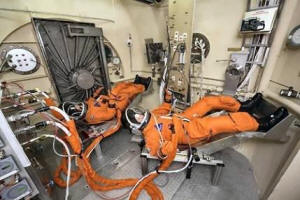|
 First
manned test flight of new deep-space capsule likely delayed: NASA First
manned test flight of new deep-space capsule likely delayed: NASA
 Send a link to a friend
Send a link to a friend
[September 17, 2015]
By Irene Klotz
CAPE CANAVERAL, Fla. (Reuters) - The first
manned test flight of NASA's new deep-space Orion capsule faces a likely
two-year-year delay until 2023 due to development and budget concerns,
officials with the U.S. space agency said on Wednesday.
|
|
 The capsule, along with its multibillion-dollar heavy lift
launcher, are the most expensive parts of a long-term U.S. human
space exploration initiative leading toward a crew landing on Mars
in the mid-2030s. The capsule, along with its multibillion-dollar heavy lift
launcher, are the most expensive parts of a long-term U.S. human
space exploration initiative leading toward a crew landing on Mars
in the mid-2030s.
NASA had been aiming for its first crew test flight of Orion in
August 2021. But on a conference call Wednesday, NASA Associate
Administrator Robert Lightfoot told reporters the agency had lost
confidence in that date.
Given technical, financial and management hurdles the capsule will
face during development, he said an April 2023 launch date now
seemed more likely.
NASA plans to spend another $6.77 billion between October 2015 and
April 2023 for two of the new Orion capsules, which are currently
under development by lead contractor Lockheed Martin Corp.
The agency has already has paid $4.7 billion for Orion design and
development, Lightfoot said.
He said an unmanned Orion was still scheduled for liftoff in
December 2018, carried aloft by a Space Launch System (SLS) rocket
that is the focus of a separate $7 billion development effort.
NASA intends to first test an Orion capsule in a lunar orbit, then
use it for a mission to rendezvous with a boulder that has been
robotically plucked from the surface of an asteroid and positioned
into an distant orbit around the moon.
“We’re really trying to build a program,” said William Gerstenmaier,
NASA associate administrator for human exploration and operations.
“Ultimately, we’d like to get where we’re flying these missions
about once per year.”
[to top of second column] |

NASA last year announced an expected year-long schedule slip for the
debut flight of the SLS rocket, previously targeted for November
2017.
So far, the agency has not provided cost estimates for any missions
or production cost beyond the first test flight of Orion, the U.S.
Government Accountability Office said in a report issued in July.
NASA spent about $9 billion between 2005 and 2010 on a previous
human space exploration initiative called Constellation. That
included $5.8 billion for an earlier version of Orion.
(Reporting by Irene Klotz; Editing by David Adams and Tom Brown)
[© 2015 Thomson Reuters. All rights
reserved.]
Copyright 2015 Reuters. All rights reserved. This material may not be published,
broadcast, rewritten or redistributed.
 |